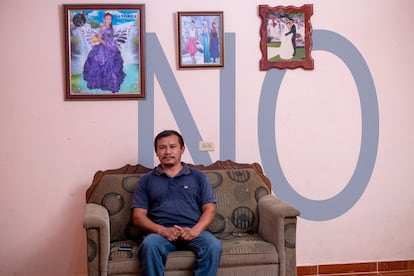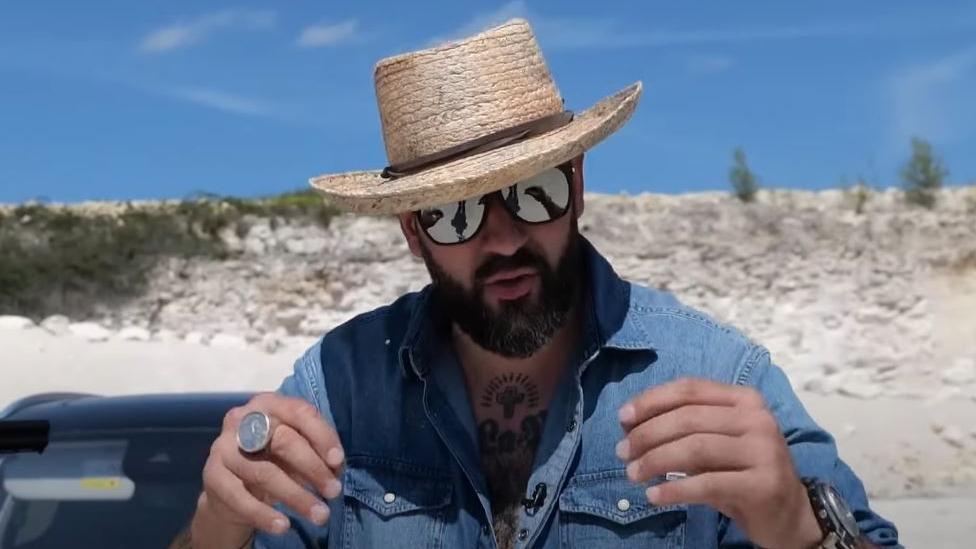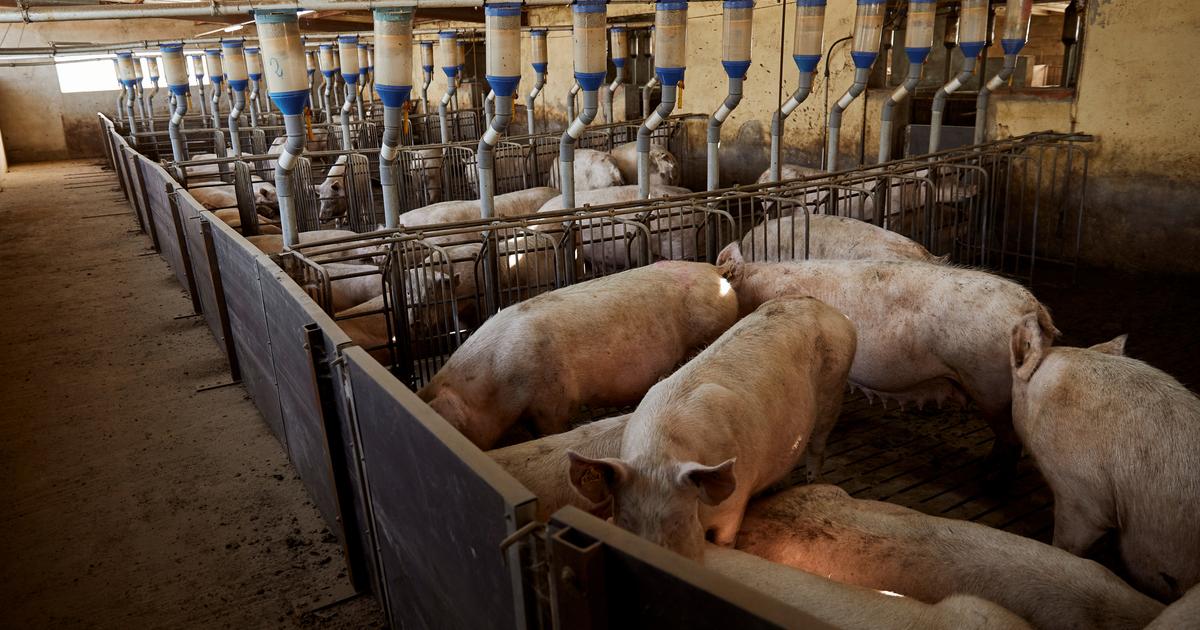A quiet walk can become, as in the case of Kinchil, a vital problem for its inhabitants. At the end of 2018, during the search for some heads of cattle in a remote area of the jungle that surrounds this town of Mérida, in the Mexican state of Yucatán, some shepherds discovered something: some hidden hoses through which waste from the Kekén pig farm, of the Kuo Group, located between the towns of Kinchil and Celestún, and which had formed a lagoon of green and pestilent water.
The responsible company assured through a press release that it was an irrigation system, but this explanation was not convincing. At least not to people like Alberto Rodríguez, nicknamed
El Jaguar
, a prominent member of the Mayan Council of the Poniente de Yucatán Chik'in Ja', and the protagonist of the documentary
Laguna Negra
, which narrates water contamination through the discharges discovered.
Rodríguez clarifies that an irrigation system, in addition to being unnecessary in the jungle, alters the cycles of flora and fauna.
The Yucatan soil is karstic and quickly filters the water to the subsoil, where freshwater reserves are stored.
El Jaguar estimates that 82,000 liters of water from the farm could be stored daily, but he assures that some of the Kekén workers with whom he shared his estimates laughed at him.
“That's just in the morning.
The tanks overflow, that's why it is pumped day and night," he says now.
Martín Humberto Solís votes yes: "Before the farm, the young people were crowded together in the morning waiting for the place where they sell beer to open," he argues.
Solís owns land between the farm and the highway, and obtained a 30-year right-of-way contract with the Kekén company.Antonio Lopez Diaz
The Kinchil farm is an example of intensive farming, one that houses thousands of animals in a single facility. Its relevance has now been discussed as a result of the declarations of the Spanish Minister of Consumption, Alberto Garzón, against this model and the enormous areas where animals are raised for human consumption. Greenpeace data on the Kekén facilities in Yucatán speak of 70,000 productive females, two slaughterhouses with a daily slaughter capacity of 5,000 animals, and a production of 180,000 tons of pork per year, most of which are exported to the Asian market.
In Yucatan a long time ago a social fracture was generated between critics and supporters of this business model. In this case, due to the dilemma between the pollution caused by these spaces and the generation of purines (liquid excrement) that end up in the water reserves used for agriculture and human consumption. On the other side of the scale, as a benefit, is the number of jobs that this type of business generates. This is a debate on which Kekén has not wanted to comment (this newspaper has contacted the company on several occasions).
The Mayan Council to which El Jaguar belongs was founded by 70 people from different communities who raised their voices through demands before the State Government, the Secretary of the Environment (SEMARNAT) and the Federal Attorney for Environmental Protection (PROFEPA), of those who claim not to have received answers.
The activist accompanied Greenpeace Mexico during the collection of samples that the NGO carried out in the area, providing data on the degree of contamination of the waters that have been published in a report on the impact of the pork industry in Yucatan.
Jose Luis Tzuc Canté votes no to the continuity of the macro-farm: “My people are afraid that they will not get something that they have not been promised.
That they hope that it will touch them, but that it will never touch them.” Antonio Lopez Diaz
Jorge Herrera-Silveira is a doctor in Biology at the Cinvestav Department of Sea Resources, in Mérida. He has been publishing studies for decades on the impact of groundwater discharge on the Yucatan seabed and how it transports pollutants that deteriorate the coastal ecosystem. In his opinion, this marine system is highly influenced by these discharges. "Localities such as Celestún are included in the so-called ring of cenotes, in the discharge zone, and have an important influence on the hydrochemistry along the coast." In his studies he denounces how human activities have altered the balance of ecosystems, and already in February 2010 he pointed to the activities of the pig industry as the main contributor of nitrates to the water.
Alberto Velázquez belongs, for his part, to the Indignation organization, which advises the Chik'in Ja' Maya Council in its legal actions. The expert details how water resources are used in Yucatan, which has one of the largest freshwater reserves on the continent. “The pig industry needs a lot of water for the pigs, which have to be constantly wet. They extract many liters and here this action is very little regulated”. SEMARNAT and CONAGUA, the state water network, give permission to obtain it, but do not have the capacity to measure how much is extracted, nor is it regulated how much is injected into the ecosystem.
In the last two decades, Yucatan notably increased its pork industry for large-scale meat production. The State Government has incorporated it into this sector as one of its central axes in the development plan, and this, through the Kuo group, has made million-dollar investments in the peninsula. The procedures for the permits of the companies have been hermetic, assures Velázquez. According to the Greenpeace report, of the approximately 300 existing farms in the region, only 20 have carried out the environmental impact study and none have had self-consultation, even though they are located in indigenous territory. At first glance, from the map it can be seen that the environmental group does not exaggerate in terms of the number of these large surfaces in the area.
Eva Ventura Tus votes yes: "The farm brought us many benefits, Kinchil is no longer a marginalized area." What she does not like is that she knows that the Kekén company can avoid the pollution it generates, but it is not doing so, according to affirms.Antonio Lopez Diaz
According to data handled by Chik'in Ja', only on the Kekén farm there are 10,000 sows that give birth to between seven and twelve piglets in approximately ten pregnancies during their fertile period.
Every 24 hours, about 700 piglets can be born, 20,000 per month.
They are animals that need water to, above all, keep their cages clean.
The waste or slurry generated by these facilities is treated in biodigesters or tanks.
There they are cleaned and later reintroduced into the ecosystem and to obtain fertilizers.
El Jaguar tells that once a sow begins to show signs of aging, it begins to give birth to smaller offspring that are directly used to make sausages.
The mothers are fattened up in a short period of time to later be slaughtered and their meat sold in local markets.
“That is the benefit that my community has left in exchange for dirtying our water.
I can't even consume a premium product, and I can't get it at a better price either."
Additional problem with honey
The facilities are also located in an area where there are up to eight variations of honey, so the complainants warned of the danger of this farm for bees. Perhaps to counteract this hypothesis, the owners of the pig business decided to organize their own beekeeping. Their organic honey won the second prize in a category of the First National Online Honey Contest, organized by the National Association of Veterinary Doctors Specialists in Bees, Anmvea. From Chik'in Ja' they answered indignantly that the honey that the Mayans produced ancestrally had always obtained the first prizes in terms of quality until they arrived. One of the rules to produce this product organically is that it has to be at least three kilometers away from a farm of any kind.“They are going to violate even that law,” criticizes Jesús Solís, one of the members of the Mayan Council.
Carlos Yama votes no: "If the company worked in a manner consistent with environmental standards, there would be no need for any of this that we are going through." Antonio Lopez Diaz
Jose Luis Tzuc has been collecting the product of his hives in this area for years.
“We have to be sensible, we cannot blame them directly,” he maintains.
"We need a detailed analysis, but since the farm started operating we have noticed a 30% drop in our production."
The self-consultation
Self-consultation is a right of indigenous peoples that allows them to decide on development processes and projects in their territory.
It is recognized in ILO Convention 169 and in the United Nations Declaration on the Rights of Indigenous Peoples, ratified by Mexico in 1990.
Chik'in Ja' opted not to use the Homun route (the case of six minors who stopped a similar project in court alleging that it polluted their waters) because that process is stuck in court and because in that case they were able to stop it, since he hadn't gotten into the pigs yet.
For the organization, self-consultation is more effective, because international laws say that indigenous communities must be questioned before any environmental management.
Adi Quintal votes yes: “Many need that job.
If it closes, where will they work?" Adi was one of the people who campaigned in favor of the farm's permanence. She doesn't have a job and takes care of a disabled sister. They live alone. Antonio Lopez Diaz
Three towns decided to exercise their right to consultation. Celestún, known for its beaches, for being considered a Biosphere Reserve and for being included in the World Wetland Protection Program. The lagoon of this town is the most important in the feeding of the flamingos, which attract thousands of tourists. It is located in a water discharge area, and between the town and the farm, there is a cenote that supplies water to its 10,000 inhabitants, who live from fishing and tourism. Nine people voted in favor of continuing the pig business; 1,101 spoke against. The other two are Kinchil and San Fernando, in the interior, near Mérida. They are located in a water load zone near the Ring of Cenotes Geohydrological State Reserve. Its inhabitants live from agriculture, beekeeping and livestock.
The report made by Indignation on the self-consultation in San Fernando includes the anonymous testimony of a neighbor who states that the company supported the baseball team with equipment, and that they installed a unit for health, medical and medication consultations three days before the vote.
"They were pushing from house to house."
The result was adjusted: 58 votes in favor, 59 against.
Jesús Solís Alpuche and his wife Carmen Ventura vote no.
"People defend employment. However, those who live from their work in the fields, such as in the production of honey or food, citrus fruits, are desperate." Antonio Lopez Diaz
The ballot box was ready in the plaza of Kinchil to collect the votes. Carlos Yama, one of the organizers of the process, was surprised by the arrival of a multitude of people with well-made banners showing their support for the pig company. The announcement of the consultation has broken the foundations of coexistence with mutual accusations of corruption. “At that moment a path of tension opens up. Kekén opens its arms, makes its workers aware, treats them very well, with bonuses, but there are also threats of job losses,” Yama explains. “There are employees who are with us and alert us. They told what they had seen and were fired. Most prefer to remain silent because their relatives continue in the company”.
From Chik'in Ja' they see in the performance of the farm a sign of their concern about the possible adverse result of the consultation. They give names and figures of what its collaborators have received for campaigning on their behalf, although those named deny it. They speak of a canteen fight between some of the instigators over the unequal distribution of profits.
Severo Chuil is one of those identified as collaborators of the company that mobilized people for the consultation.
He thought it was not a good idea to talk to a journalist without the consent of his bosses in Kekén, where he works.
“They didn't give us an order, but they did tell us
'
don't get involved in controversies anymore'.
Maybe if they record me, they'll take me out of my job."
The next day, in the group that the inhabitants of Kinchil have on a social network, Severo warned his neighbors that journalists paid and bribed by Chik'in Ja' had arrived, and of the danger of talking to them or giving them your data.
Candelario Colli votes yes: "The farm leaves the cheapest pigs for me to sell in the market." Antonio Lopez Diaz
The message has spread among the neighbors that the Mayan Council is only looking for the money from the company, which paid them when they started making noise and that is why they have been silent for more than a year, but they have run out of capital and they are taking up the matter again . Yama clarifies that the consultation has been planned since 2019 when this institution was created, but that the pandemic stopped them. The business did not stop, it was expanded and went from 80 to 200 workers. He played the trick of survival and the need for jobs, and approached the towns offering food in the hardest moments of confinement. These are actions that Yama calls blackmail. “We tried to make sure that people could give their opinion without fear and that they know that they have rights. The consultation comes from the international agreements that Mexico has signed, which is why it is binding.Now comes the phase in which the results are enforced. Here the permanence came out, but in the other two locations it was not like that”. In Kinchil, the option in favor of the farm won by 576 votes in favor and 423 against.
Carlos Valentín Pech is the municipal president and the proof that supports the theory about the existence of cases of corruption in the ranks of environmentalists.
At first he worked for the closure of the farm.
“But it changed
his attitude and now he avoids us at all costs,” complains Yama.
Martín Humberto Solís, the town's veterinarian, recalls that the first protests were led by the current municipal president.
"They brought a lot of press, and then we learned that the company paid him
and the movement is over.
It is mentioned that everyone was given money, that's why he had a truce of almost two years.
On this point Kekén has not pronounced either.
Both sides see Pech's behavior as proof that he has been bought by the pig company.
The aforementioned denies the accusations and declares that, when he arrived at the mayor's office, he saw that it had regularized his land ownership papers in the neighboring town of Maxcanú, so the matter had ceased to belong to the municipality of Kinchil.
“The farm has its permits.
Since I am mayor I remain neutral, I cannot act as before, that I was a beekeeper, I cannot provoke violence, it would be a serious mistake to position myself on either side”, he justifies.
Mural made by the youth of Kinchil that represents the pollution produced by the farm. Antonio Lopez Diaz
Martín Humberto Solís owns land between the farm and the highway, and he obtained a right of way contract with Kekén.
“Who wants to lose their job coming out of the pandemic?
The contamination problem is obvious, it cannot be denied.
But it is the amount that is being questioned because the farm has many water treatment controls.
That the authorities show us that they are dirty and we ourselves will force the company to take corrective measures.
To close this, they first have to show that it generates pollution, and have an alternative to the two thousand jobs that are going to be lost”.
Eva Ventura Tus voted in favor of continuity.
“I went out to support her by myself, they didn't pay me and nobody can say.
It brought us many benefits, Kinchil is no longer a marginalized area.
i know it exists
pollution, but employment is generated.
I know some biologists who worked there and one of them, nicknamed
Américo
, told me that he left his job because the company knows that the biodigesters do not work properly and could prevent spills, but they do nothing”.
Alberto Rodriguez, 'El Jaguar', was one of the promoters of the self-consultation in Celestún.
His town is on the coast and lives from tourism.
It is located in the area of discharge waters and they have noticed the decrease in the number of flamingos that inhabit the estuary and also in fishing.
In Celestún, the no to the continuity of the farm won with a large majority. Antonio Lopez Diaz
Where they documented the dirt today there is no trace of it. The area has been repopulated by the company with piñuelas and henequén, very resistant plants. “It is difficult to locate the place where they are making the discharges; We are talking about a perimeter of between 1,600 and 2,000 hectares. It was their strategy since we discovered them; they are adapting according to our steps”, assures Carlos Yama.
The Jaguar is clear about the end of this conflict. “In order for the company to continue operating, we are going to condition it because the tools exist so that they can treat the water. If you are going to produce pork, let it be for our consumption. Why do you have to sell it to the Chinese, if they have a large territory? Why don't they make their pigs there? They take advantage of the corruption that exists with our rulers, that is why Mexico is fragile. But there are brave men and women who resist. What am I leaving to that child who was born today? A place without water. They will send some criminals to make me suffer and make my body disappear and invent a story, but they will remember me as one of the heroes who ordered to take care of the water, and from my blood seeds will come out, other men, other ways of thinking. Everyone has oppressed the Mayans,now they have enslaved us again with consumerism.”
You can follow PLANETA FUTURO on
,
and
, and subscribe
to our 'newsletter'
here
.









